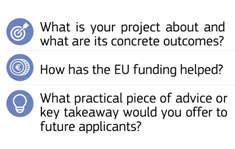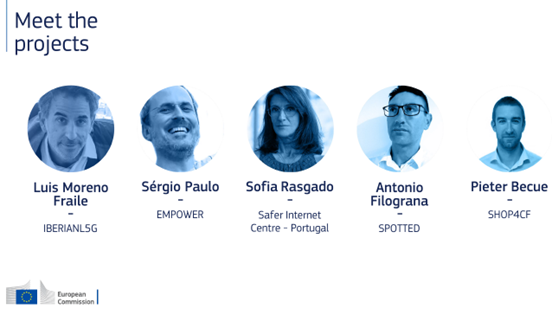Portugal is the home of the Web Summit, which offers a cornucopia of talks on every tech-related topic imaginable. Startups, investors, industry experts and tech enthusiasts gathered to network, share ideas, and look ahead to a week of exciting talks. According to Katherine Maher, the new CEO of Web Summit, “We’ve brought together tens of thousands of people who have used this week in Lisbon as a springboard to do remarkable things”. The event allows innovators “to launch companies, find investors, unveil projects, and advance a vision of the world worth debating”.

On the 1st day, HaDEA offered a masterclass to this enthusiastic crowd on “Funding the EU’S digital transition”, where projects were invited to answer three questions.
 Credits: Portuguese Safer Internet Centre
Credits: Portuguese Safer Internet Centre
The Portuguese Safer Internet Centre, represented by Sofia Rasgado shared its impact and the vital role that EU funding has played in our mission and achievements.
The Portuguese Safer Internet Centre is more than just another consortium of Public and Private organisations. It's a consortium of passionate individuals committed to making the internet a safer place. Our mission is to promote a safer and more responsible use of the digital world, especially among young people. We're driven by the belief that every online experience should be one of growth, learning, and safety.
The Safer Internet Centre is based on three core pillars:
- An awareness centre for educating children, youth, parents, and educators about online opportunities and risks.
- A helpline that supports all victims of cybercrime and digital violence and helps children and parents with digital issues.
- A hotline for combating child sexual abuse material, working closely with law enforcement and the private sector.
About the achievements and outcomes we're proud of:
One of our proudest accomplishments is our annual celebration of Safer Internet Day. This global event unites millions in the quest for a safer online environment. Our team has organised inspiring campaigns, workshops, and awareness programs. We've contacted schools, communities, and organisations, engaging over 90,000 participants this year. These events have sparked conversations, raised awareness, and left a lasting impact.
We believe young people should have a voice in shaping their digital world. Our youth participation programs have empowered young people to become digital Leaders. In the last school year, this program involved more than 2,800 students from primary and secondary schools from 110 different school clusters. They've taken the lead in promoting digital safety, both online and offline, participating in national and international conferences like the Safer Internet Forum and influencing the conversation around online safety. The "Navegas em Segurança" Program has equipped young adults to conduct peer-to-peer awareness sessions. In the last two years, 382 sessions were held, which reached 12,875 participants. Cyberbullying, online addiction, data protection, hate speech and social media were the most requested themes in 2023.
Our project doesn't operate in isolation. We've established a diverse Advisory Board, bringing together experts, educators, policymakers, and industry leaders who steer our initiatives in the right direction. We've launched impactful awareness-raising initiatives and campaigns like the CIS Digital Camp and the #lerantesclicardepois. These efforts have reached a broad audience, promoted safer digital practices and instilled a sense of responsibility.
Since 2019, the helpline has assisted more than 1,621 victims, and the hotline received 3,398 reports and categorised 3,980 images.
Our project website and social media platforms have become hubs for information, resources, and conversations about online safety. We've successfully created a supportive online community where people can access the latest news, tips, and best practices. In 2023, there were over 2,500 downloads from the resources area on the project website.
Our efforts have not gone unnoticed by policymakers. We've actively engaged with national policies to advocate for safer internet practices. The Ministry of Education and the Secretary of State for Digitalisation and Administrative Modernisation have recognised the importance of our work, leading to more comprehensive strategies for online safety.
How did the EU funding help in realising our project?
It was the cornerstone of our success. EU funding gave us the financial support necessary to bring our vision to life. It allowed us to expand our reach and services, create meaningful resources, and involve more stakeholders. Our project is just one piece of a much larger puzzle. We're part of a broader EU initiative, connecting us with like-minded projects and sharing knowledge across borders. This network is the magic behind the EU's added value. It turns individual projects into a powerful collective force for a safer digital world. Together, we contribute to the European Strategy for a Better Internet for Kids and the BIK platform.
Finally, what is the best practical takeaway from our journey for potential new applicants?
- Embrace collaboration
- Seek partnerships
- Involve young voices
- Leverage EU funding
Online safety isn't a singular effort; it's a shared responsibility. By building bridges between countries, organisations, and individuals, we can advance towards safer digital spaces, reshape societal perspectives, and advocate for change. Together, we can build a safer digital future for all.

Credits: Portuguese Safer Internet Centre
Find out more about the work of the Portuguese Safer Internet Centre, including its awareness raising, helpline, hotline and youth participation services – or find similar information for Safer Internet Centres throughout Europe.
Portugal is the home of the Web Summit, which offers a cornucopia of talks on every tech-related topic imaginable. Startups, investors, industry experts and tech enthusiasts gathered to network, share ideas, and look ahead to a week of exciting talks. According to Katherine Maher, the new CEO of Web Summit, “We’ve brought together tens of thousands of people who have used this week in Lisbon as a springboard to do remarkable things”. The event allows innovators “to launch companies, find investors, unveil projects, and advance a vision of the world worth debating”.

On the 1st day, HaDEA offered a masterclass to this enthusiastic crowd on “Funding the EU’S digital transition”, where projects were invited to answer three questions.
 Credits: Portuguese Safer Internet Centre
Credits: Portuguese Safer Internet Centre
The Portuguese Safer Internet Centre, represented by Sofia Rasgado shared its impact and the vital role that EU funding has played in our mission and achievements.
The Portuguese Safer Internet Centre is more than just another consortium of Public and Private organisations. It's a consortium of passionate individuals committed to making the internet a safer place. Our mission is to promote a safer and more responsible use of the digital world, especially among young people. We're driven by the belief that every online experience should be one of growth, learning, and safety.
The Safer Internet Centre is based on three core pillars:
- An awareness centre for educating children, youth, parents, and educators about online opportunities and risks.
- A helpline that supports all victims of cybercrime and digital violence and helps children and parents with digital issues.
- A hotline for combating child sexual abuse material, working closely with law enforcement and the private sector.
About the achievements and outcomes we're proud of:
One of our proudest accomplishments is our annual celebration of Safer Internet Day. This global event unites millions in the quest for a safer online environment. Our team has organised inspiring campaigns, workshops, and awareness programs. We've contacted schools, communities, and organisations, engaging over 90,000 participants this year. These events have sparked conversations, raised awareness, and left a lasting impact.
We believe young people should have a voice in shaping their digital world. Our youth participation programs have empowered young people to become digital Leaders. In the last school year, this program involved more than 2,800 students from primary and secondary schools from 110 different school clusters. They've taken the lead in promoting digital safety, both online and offline, participating in national and international conferences like the Safer Internet Forum and influencing the conversation around online safety. The "Navegas em Segurança" Program has equipped young adults to conduct peer-to-peer awareness sessions. In the last two years, 382 sessions were held, which reached 12,875 participants. Cyberbullying, online addiction, data protection, hate speech and social media were the most requested themes in 2023.
Our project doesn't operate in isolation. We've established a diverse Advisory Board, bringing together experts, educators, policymakers, and industry leaders who steer our initiatives in the right direction. We've launched impactful awareness-raising initiatives and campaigns like the CIS Digital Camp and the #lerantesclicardepois. These efforts have reached a broad audience, promoted safer digital practices and instilled a sense of responsibility.
Since 2019, the helpline has assisted more than 1,621 victims, and the hotline received 3,398 reports and categorised 3,980 images.
Our project website and social media platforms have become hubs for information, resources, and conversations about online safety. We've successfully created a supportive online community where people can access the latest news, tips, and best practices. In 2023, there were over 2,500 downloads from the resources area on the project website.
Our efforts have not gone unnoticed by policymakers. We've actively engaged with national policies to advocate for safer internet practices. The Ministry of Education and the Secretary of State for Digitalisation and Administrative Modernisation have recognised the importance of our work, leading to more comprehensive strategies for online safety.
How did the EU funding help in realising our project?
It was the cornerstone of our success. EU funding gave us the financial support necessary to bring our vision to life. It allowed us to expand our reach and services, create meaningful resources, and involve more stakeholders. Our project is just one piece of a much larger puzzle. We're part of a broader EU initiative, connecting us with like-minded projects and sharing knowledge across borders. This network is the magic behind the EU's added value. It turns individual projects into a powerful collective force for a safer digital world. Together, we contribute to the European Strategy for a Better Internet for Kids and the BIK platform.
Finally, what is the best practical takeaway from our journey for potential new applicants?
- Embrace collaboration
- Seek partnerships
- Involve young voices
- Leverage EU funding
Online safety isn't a singular effort; it's a shared responsibility. By building bridges between countries, organisations, and individuals, we can advance towards safer digital spaces, reshape societal perspectives, and advocate for change. Together, we can build a safer digital future for all.

Credits: Portuguese Safer Internet Centre
Find out more about the work of the Portuguese Safer Internet Centre, including its awareness raising, helpline, hotline and youth participation services – or find similar information for Safer Internet Centres throughout Europe.
- online safety media literacy
Related content
- < Previous article
- Next article >











